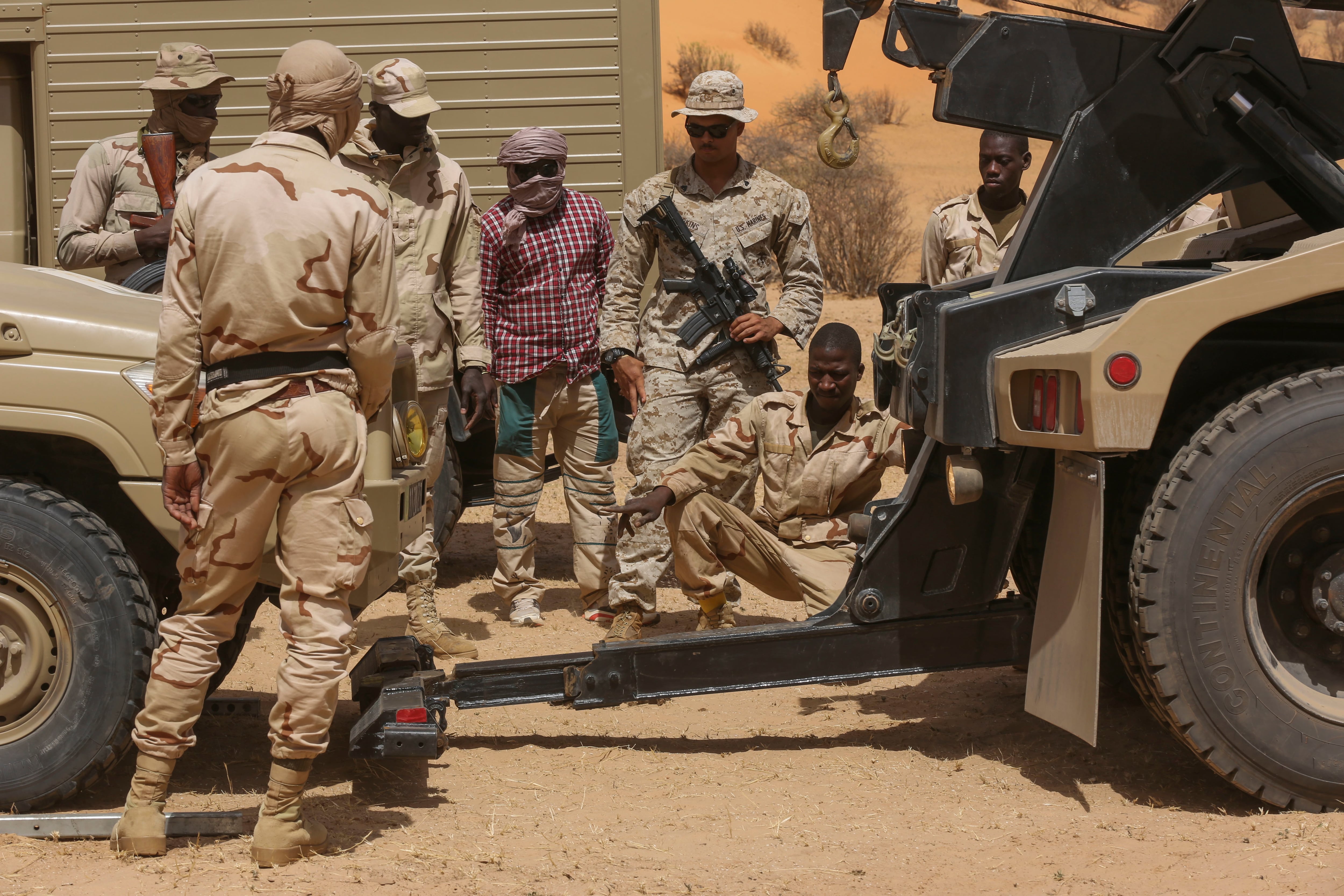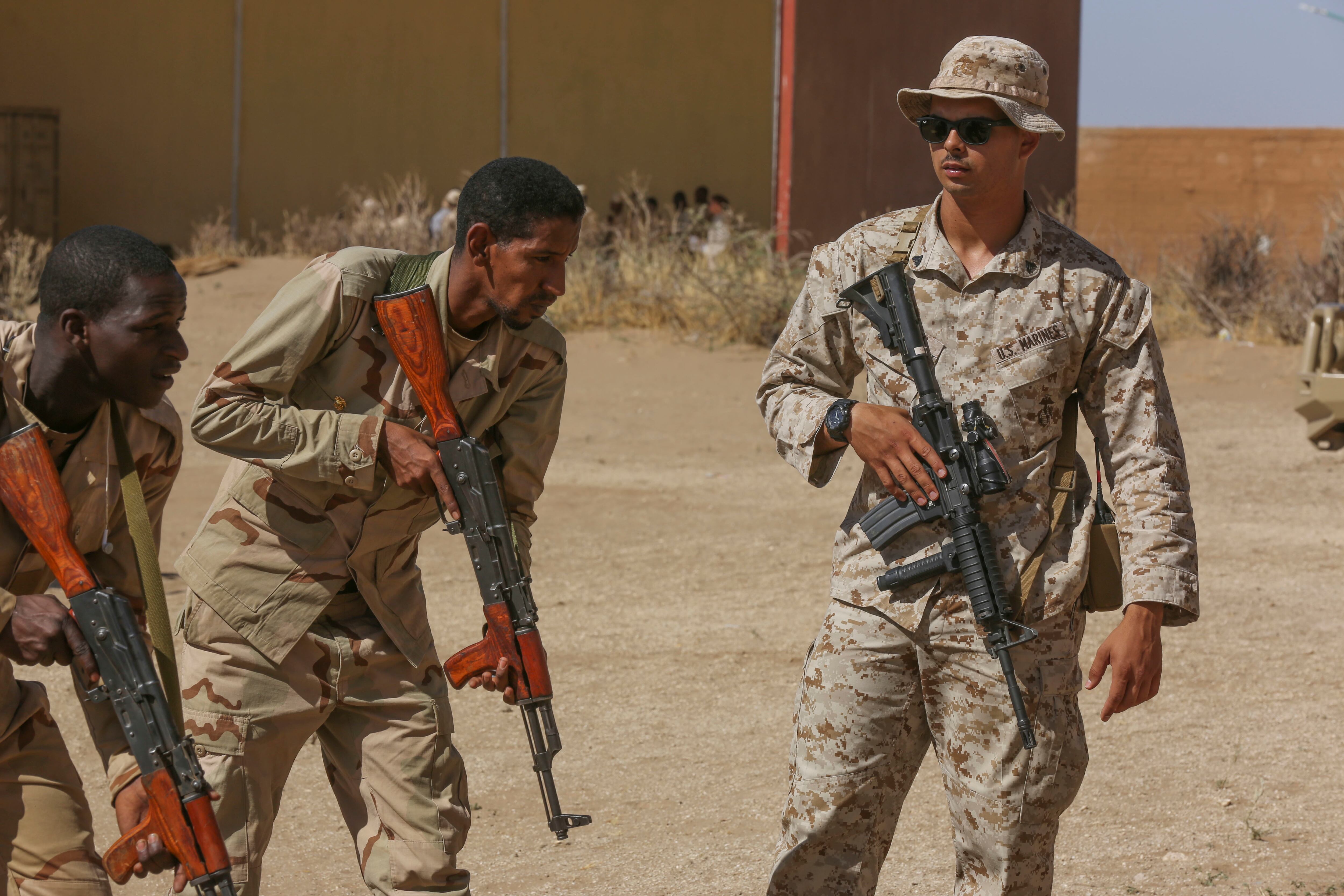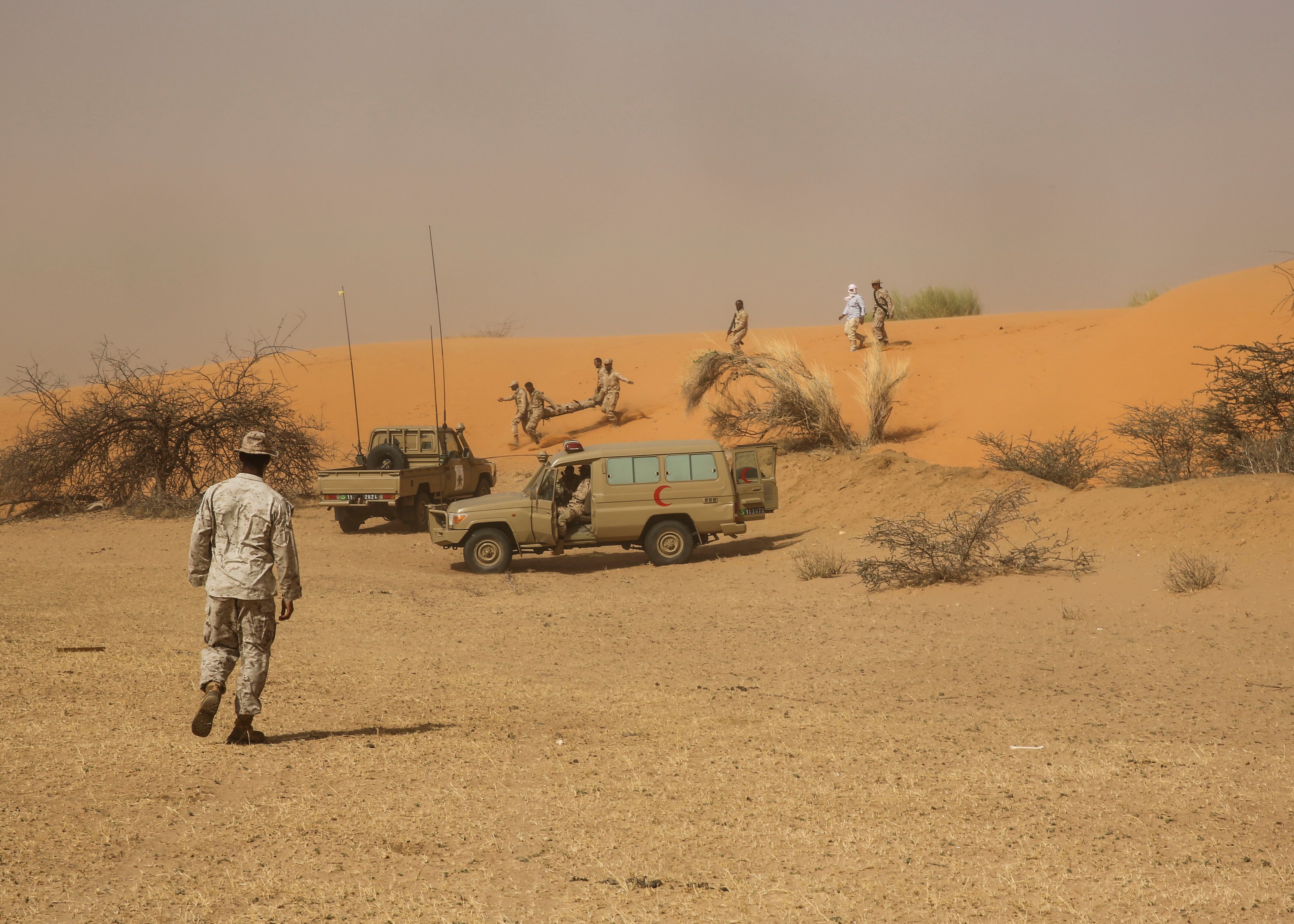U.S. Marines are operating in a West African country where the world's most troubling terror groups have formed an alliance of sorts. Combat Logistics Battalion 6 knows how to fight terrorism where the rubber meets the road. Literally.
Marines with Combat Logistics Battalion 6 recently wrapped up a five-week monthslong mission in Mauritania, where the Islamic State group, Boko Haram and al-Qaida have teamed up to train new terrorists at terror camps. On Feb. 19, the Marines of CLB-6, assigned to Special-Purpose Marine Air-Ground Task Force Crisis Response — Africa, wrapped up a monthlong theater security cooperation mission in the Islamic Republic of Mauritania in West Africa, where they trained the Logistics Battalion of the Mauritanian army in all aspects of convoy operations.
The Marines' mission was launched at the request of the Mauritanian government as local troops fight terrorists operating along the borders. Mauritania shares borders with Mali and Algeria — both of which have seen troubling terror attacks in recent years.
Veryan Khan, editorial director for the Terrorism Research & Analysis Consortium — a group that tracks international terrorism, told Fox News in 2015 that ISIS, Boko Haram and al-Qaida were working together in the Sahara Desert in Mauritania. The groups had aligned to expand a so-called caliphate across North and West Africa, Fox reported.
"The situation in Mauritania is a powder keg very few people are talking about," Khan told the station.
The Marines in Mauritania were training local logisticians on convoy operations. The Mauritanian logistics battalion supports its army's infantrymen as they operate along the borders.

Cpl. Bobby Adkins, a motor transportation operator, evaluates Mauritanian soldiers during a training exercise in Tiguet, Mauritania. Marines assigned to Special-Purpose Marine Air-Ground Task Force Crisis Response - Africa recently spent five weeks training with their Mauritanian counterparts.
Photo Credit: Cpl. Olivia McDonald/Marine Corps
Marine Cpl. Hunter Williams, a field radio operator with CLB-6, was responsible for training who trained the Mauritanians in radio communications. The Mauritanian soldiers will take this training to units securing the country’s borders, said Cpl. Hunter Williams, a field radio operator with CLB-6 who trained the Mauritanians in radio communications."Their job is to support the infantry that’s on the border," he said. "They’ll use [the training] whenever they go on convoys to support them along the border in fighting terrorism."He Williams was responsible for teaching 15 students in radio communications, taking them from a zero-knowledge baseline to full tactical proficiency over the span of the course.
"Toward the end of the training, when they put it all together and you see how much they learned, how much you taught them, how much they learned from you," Williams said, "...I thought that was pretty cool."
Williams kicked off the training with Following a one-week introductory session. for the training cohort, he He then led more advanced training in which he focused on broke out his students for a deep dive into the art of the radio operator, teaching them VHF and HF communications for convoy operations and patrolling.
The CLB-6 Marines, who are currently assigned to Special-Purpose Marine Air-Ground Task Force Crisis Response — Africa, also taught instructed the Mauritanians in motor transportation maintenance, supply, field medicine and weapons marksmanship. Sgt. Douglas Lancie, a motor transport Marine with CLB-6, found his students already up to speed when he set out to teach them vehicle mechanics and maintenance.

A Marine observes Mauritanian soldiers' shooting positions before a live-fire exercise in Tiguet, Mauritania, on Feb. 15.
Photo Credit: Cpl. Olivia McDonald/Marine Corps
With a fleet of Toyota pickup trucks, a couple of Mack trucks and a single Humvee at hand, the soldiers were well-versed in fixing broken vehicles, he said.
"It almost seemed like they already had a mechanic background," Lancie said. "It turned out that a lot of them worked in automotive shops before they joined the military," Lancie said.
What they did lacked, however, was confidence in vehicle upkeep. Lancie set out to improve those skills through training on hit this through instructing them in the finer aspects of diesel engines and transmission operations as well as preventive maintenance checks and services.
"They were able to do it, but they lacked the confidence; wWe showed them that things weren’t as difficult as they seemed," he said. "As we progressed, they just got better and better and it was really rewarding to see the training affect them in a positive way."
At the conclusion of the course, the Marines ran the group through a final exercise to evaluate their progress.
The Mauritanians were tasked with running a convoy to fix and recover a disabled vehicle. They were hit with simulated — notionally — with improvised explosive devices and small-arms fire. They took casualties and their own vehicles went down.
The Mauritanians But they pushed through, Williams said. They stabilized stabilizing the wounded and repaired bandaging their vehicles on the fly in order to to carry on and successfully complete the mission.
"It went great; they did a pretty good job," Williams said. "Seeing my guys calling nine-lines [casualty evacuations], IED reports, small arms reports … just seeing them work the radios — they showed just how much they improved from the first day we started training them."
The soldiers will soon move out to forward bases along Mauritania’s vast, 3,10053-mile border, where the stakes are high in the real-world application of the training the Marines provided.

Mauritanian soldiers treat mock casualties during a Marine Corps-led training exercise there in February.
Photo Credit: Cpl. Olivia McDonald/Marine Corps
According to the Central Intelligence Agency, Mauritania's its porous borders leave the country vulnerable not only to terrorism — al-Qaida al Qaeda in the Islamic Maghreb has a recent history of successful attacks — but also human trafficking and refugee movements.
Mauritania’s logisticians Logistics Battalion will directly support its army’s security efforts along its borders as well as peacekeeping operations in the Central African Republic, Maj. Mohamed Salem Abeid, the unit’s commander, said in a Marine Corps release.
"We used to have lots of skirmishes at the border," he said. "Now with [U.S.] help over these past few years, we have the knowledge and experience to secure our border, maintain it and assist other areas in Africa."
CLB-6’s theater security cooperation mission is part of a broader U.S. effort known as Operation Juniper Shield to use military-to-military training and information sharing to fight terrorism across North and West Africa. Along with Algeria, Burkina Faso, Chad, Mali, Morocco, Niger, Senegal and Tunisia, the U.S. nited States works to build local capacity to counter and defeat extremist organizations in the region.
For their part in the fight, the SP-MAGTF-CR-AF Marines were awarded Mauritania's "Medaille d'Honneur" at the training's concluding ceremony last monthFeb. 19. If not equal in prestige to its American cousin, it nevertheless brings great credit to the Marine Corps uniform.
Matthew L. Schehl covers training and education, recruiting, West Coast Marines, MARSOC, and operations in Europe, Africa and the Middle East for Marine Corps Times. He can be reached at mschehl@marinecorpstimes.com.





